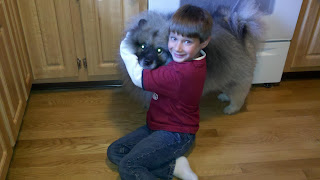And so it begins...
Anyone who knows Wilson will tell you he is a very kind human. I am proud to say I have heard it from many teachers, adults, and even a handful of kids. He’s always been that way; he's very empathetic and someone who doesn’t start a fight. So, it was a great surprise to me when Wilson's behavior was the first thing I heard about in kindergarten. We had never heard this in all his years in daycare/pre-school.
The first parent-teacher conference was a shock. It started with the teacher sliding Wilson’s handwriting across the table and telling me it was a problem. No solution was offered. Then she told me Wilson had pushed someone on the playground. Not that day, but recently. No real details about what happened; she had heard it from the aides. I asked if she saw anything positive and mentioned that Wilson was really funny, hoping it would trigger a compliment. She hadn’t noticed. Apparently, no one had taught this young teacher the “sandwich method” that most managers learn - good news, bad news, good news.
Throughout the year, I would get notes about Wilson’s behavior. He was getting easily upset, blaming other kids for things, and starting to be disrespectful. It was hard to hear because he had never been like that before. I did not get suggestions on how to improve or what we could work on together, and every note included “Wilson knows better.”
Throughout that entire year, I never heard anything positive. Kindergarten ended without anything being solved. My happy, smart child did not seem to be either anymore.
There were rumors that summer that his kindergarten teacher was looping; she would be teaching first grade the following year. I could not think of anything worse for Wilson. During the summer concerts, many parents in that class also shared that she didn’t seem to like any of the boys. The teacher he wound up getting had a reputation for being tough, and I figured it might be what he needed. She was a veteran teacher with kids of her own.
Unfortunately, first grade started with some of the same issues. However, the parent-teacher conference was much different this year. As we sat across the table from each other, Wilson’s teacher flipped through his work and observed that it was very inconsistent. Whatever grades/tests he had at that point were not showing any patterns. Even though Wilson had tested out of Title 1 support for the first step in interventions, his teacher was going to get him in for both math and reading.
For those of you who do not know, Title 1 is a grant-funded program that provides academic support to kids in low-income families to help them meet state standards. Because the funding and program are based on socioeconomic needs, not every school in a district might qualify. In fact, Wilson’s elementary school no longer does. https://www.doe.mass.edu/federalgrants/titlei-a/default.html
Wilson's teacher and I kept in touch throughout the year. Sometimes we had weekly check-ins about his behavior, which was tracked with green, yellow, and red lights. We wondered whether it might be ADHD, even though he was not as hyperactive as some of the other boys in her class. Growing up with sisters and having one child, I never knew what was considered a “boy thing” and what was an issue. We did a preliminary screening, and it was not conclusive. Maybe we should have focused on the attention issues.
Anyone who knows me knows I am a pack rat and save papers and e-mails. I found one email about Wilson spinning in circles while everyone else was in line. I found another from December in 1st grade after a bad day:
“I talked to Wilson tonight about his day. He told me he's having a hard time focusing because his brain isn't working right -- one of the computers in his brain is on fire. I asked about a few things to figure out more and he said something about the words on the page being too small. I'm wondering if he's really having a vision problem or was open to suggestions. The doctor only tested for distance, not close up. It could be an issue.”
So he got reading glasses, just some “cheaters,” but something to try. It didn’t make much of a difference, and he lost them. (Looking back, I feel terrible that we didn't understand what he meant.)
As I mentioned before, we read together a lot, especially when it was now his homework. Wilson did a lot of the “pre-reading,” telling you the story he sees in the pictures and reciting the stories we would often read. Wilson was also a champion at sounding out words. He would say the sound of every single letter, not usually remembering the blends. He might not say “cat” correctly but would read “Christmas.” A word read correctly on one page might not be figured out three pages later.
My sister, who teaches kindergarten, my mom, who is a teacher’s aide, Wilson’s teacher, and I were coming to the conclusion that maybe WIlson was dyslexic. His September birthday meant he was one of the oldest in his class, which most likely meant it was not developmental, and holding him back would not be a benefit. At this point, it was getting late in the year to start school testing. We also had good friends who started with that approach and then got a neuropsych. Starting with outside testing seemed the better approach, so we started exploring how to get formal testing.
And that is the story for the next blog.






Comments
Post a Comment